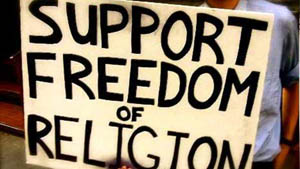Every year the US State Department releases an annual report on human rights, human trafficking and religious freedom.
On Tuesday, David Saperstein, Ambassador-at-large for International Religious Freedom, addressed the Media Hub in a telephonic press briefing from Mexico, where he discussed developments in regards to freedom of religion in Africa, and elsewhere, during 2015, as part of Washington’s International Religious Freedom Report.
“These non-state actors often act with the claim of religious justification for the violence that they impose on the populations that they control,” said Saperstein, referring to Boko Haram and Al Shabaab.
“It’s had a devastating effect on people who are from different minority, or from others who interpret the same religion differently and disagree with the mainstream.
“This has led to the brutalising of populations, the ethnic cleansing of minority populations, forced conversions, forced marriages, torture and crimes against humanity involving many of these players,” said Saperstein.
The ambassador explained that the actions of Islamist extremists also destabilised governments, regional states and localities, making it difficult for these authorities to provide core services to their respective populations, including providing protection.
One of the problems facing religious freedom, specifically in Africa and the Middle East, were various blasphemy and apostasy laws.
People who disagreed with various religious interpretations, or rejected religion, were often convicted of transgressing these laws and consequently faced criminal prosecution and imprisonment.
Some of those convicted were also sentenced to death or life imprisonment. About a quarter of countries across the globe have blasphemy and apostasy laws.
“It is hard to think of something that is a clearer violation of religious freedom than to criminally punish someone simply because they’ve spoken their heartfelt conscientious beliefs about religion and therefore we have been deeply troubled by these laws,” said Saperstein.
“Obviously in Africa, there are several countries. Sudan has both apostasy and blasphemy laws. Somalia has apostasy laws. There are blasphemy laws in some states of Nigeria.
“And there were some convictions on those this year in some of the state courts. So this remains a source of concern in Africa as well as in other areas across the globe,” added the ambassador.
Saperstein explained to the international journalists, who took part in the telebriefing from capitals around the world, that the 2015 report had been assembled with the help of civil society groups and NGOs, who engage in matters relating to freedom of religion.
In response to what the US was doing to help African countries advance religious freedom, Saperstein said the US had an Aid programme which provided humanitarian and development assistance.
The Populations, Refugees and Migration programme also helped displaced populations, including the millions of people who had been displaced, killed and injured by groups such as Boko Haram.
“In the Central Africa Republic, we have supported efforts to create a network of religious leaders from the Muslim and Protestant/Catholic communities to collaborate in encouraging peaceful inter-faith coexistence and reconciliation in their programmes,” explained Saperstein.
“We support media campaigns, do training and cultural performances and town-hall events that empower community members to become active leaders with having conflict de-escalation skills.”
The US Africa Centre for Strategic Studies, a branch of the US Department of Defence, recently put out a report stating that Saudi Arabia, and other conservative Gulf States, were promulgating a conservative interpretation of Islam throughout East African mosques, and madrassas or schools, which had a correlation with increasing acts of religious violence carried out in the area.
--ANA--













